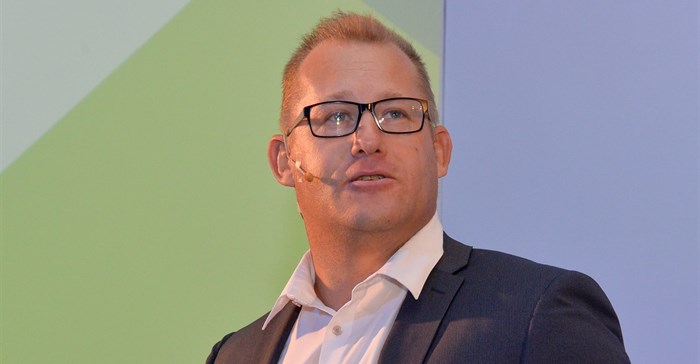
Doug Woolley
Hectic. [laughs] It’s a frantic pace because we are fairly broad in terms of the markets we cover - from consumer which is FMCG, right through to the largest enterprises which is a different value proposition and a different sell. So it's trying to cover all of that - very different markets and different routes to market as well.
In a lot of instances it’s through third-party solutions providers, in other instances it’s through very small mom and pop shops, in other instances it’s through the big retailers like Incredible Connection, and then, in a lot of instances, it's direct engagement that we have with customers ourselves.
So it’s quite a broad portfolio, different routes to market, and basically covering the end-to-end spectrum from consumers through to SMEs, through to large enterprises, through to public centres. It really is quite hectic.
Also just getting to grips with it. Working for a multinational does have its up and downs because there is a bit of a matrix management approach, so it’s often more collective decision-making which slows things down a bit. But you get used to it. That’s how it is in a multinational.
What does brand management mean to you?
There are two ways I look at it: from a personal perspective, I think with a strong brand like Dell, it does make it much easier to permeate your message, to connect with the buying centre you’re trying to target. A strong brand definitely helps the sales activity and sales motion.
From a local perspective, I think Dell has got a very reputable and strong brand and strong brand equity. And that’s right from consumers that buy our kit through to corporate. I must say, it’s definitely an easier sell because we’ve built up very strong brand equity. We have some good values behind us like reliability, quality products etc. Generally, people that buy it know that they’re going to get great service and secondly that the product they buy will manage their needs.
Even though there's a lot going for the brand, there’s always more you can do. I think the key of brand management is to not rest on your laurels, to stay true to the value systems of the underlying value systems that you’ve built, and then react when customers get edgy. When there’s a problem, resolve it quickly and take the punches if you have to. That’s actually one of the biggest things - be honest and open when you have messed up. Don’t try and hide.
What’s your main brand objectives for 2017?
Marketshare [laughs] I think, like most multinationals, it is obviously to get our unfair share of the market. But that’s beside the point. I mean, revenue is an important driver in our business, but I think it really is about successfully meeting the needs of the buying centre we’re addressing... be it a school kid that’s buying one of our retail-based notebooks, or a large IT infrastructure in a bank. It’s about making sure we meet our consumers’ needs. We’re making a difference in whatever they’re doing and hopefully we’ll be doing that across the range of our products out there... that innovation, changing the way people work, react, behave, and live. We want to really use technology to improve people’s lives over the long term.
What do you see currently as the main challenges and/or opportunities for the ICT sector?
In South Africa specifically, I think the challenge is probably more around skills. I don’t think we’re getting enough people into the industry with the desired skills. I think a lot of countries are struggling with it because the change of pace is so fast. I also think the whole industry is trying to reestablish and reposition itself. Business models are changing and technology is at the forefront of this. You can either embrace it or be scared of it.
The opportunity is massive. You can literally build or change any business process instantaneously. In time, every business will have to think and behave like a software-based business because you have to break down business processes to speed up your offering to your consumers.
Millennials are the new consumer and they have no fear of technology. They’ve grown up with it, they expect it, and they expect it instantaneously - it’s part of their DNA. It’s a very consumeristic world we’re in and consumers can change at will. So every company has to be very agile - and that’s the opportunity and the threat because if you embrace it and change your business to address that, the world is your oyster. But if you don’t, you’ll become a dinosaur quicker than you think. It’s scary, but it’s also exciting if you embrace the change.
How important has embracing digital transformation been for Dell?
If you don’t, you die. We’ve embraced it, we believe were a change agent. I mean our founder, Michael Dell, recently completed the biggest IT acquisition in the world - it’s a trillion rand acquisition to put it in perspective. That’s purely because he believes that if we don’t go on a digital transformation journey we’ll become irrelevant. We’re embracing it and we want to take people on the journey with us. We want to change lives for the better.
We just had 4000 senior managers spend a week together in Las Vegas just to talk about digital transformation. A lot of money was spent on this and we got the message ingrained for four days. If that’s not serious about digital transformation, then I don’t know.
What do you love most about working on the DellEMC brand?
It’s a great brand, I always say tongue in cheek that 'at last my kids know what I do now'. It's a very strong and powerful brand and it’s well-respected. The people that work for Dell are also very upbeat, enthusiastic people. Especially at a South African level, we’ve got a very nice team dynamic. I think Dell tends to attract people like that - people with a lot of energy, who want to give and make a difference. It’s really a lovely brand to work for, internally and externally.



























































